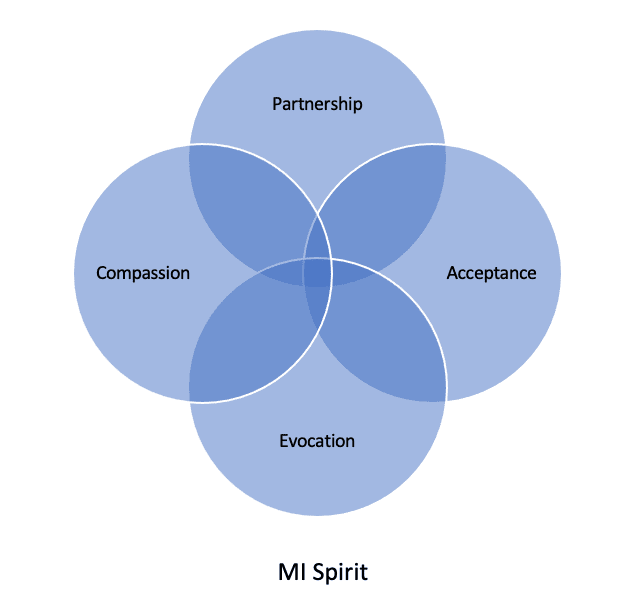Understanding Motivational Interviewing
Motivational Interviewing (MI) is a way to create conditions that support autonomy, health, and growth. (MI) is a person-centered counseling method that helps people make positive behavior changes in line with their own goals and values. It was developed by psychologists William R. Miller and Stephen Rollnick for use in situations where one person is acting as a helping professional for another.
This collaborative and goal-oriented communication style involves:
- creating an atmosphere of acceptance and compassion
- paying attention to the language of change
- addressing the common problem of ambivalence about change, and other factors that make change difficult
- expanding a person’s sense of agency
- exploring a person’s own reasons for change
- strengthening a person's own motivation, commitment, confidence, and action toward specific goals
The Academy teaches MI as a way to:
- Shift decision-making power from the helping professional to those you serve, centering the agency each person holds in their own lives
- Equip care providers to initiate and navigate difficult conversations about behavior change as caring and skillful guides
- Avoid harm related to unequal power dynamics or ineffective counseling approaches
- Strengthen helping relationships
- Facilitate insights and behavior changes that lead to improved health and wellbeing
MI has been used to help people reduce harms related to drug use (alcohol and other drugs); prevent or manage chronic illnesses; improve other physical and mental health outcomes; promote engagement in care; strengthen outcomes in education and social service settings; and more.
How Motivational Interviewing Works
MI Principles
MI Principles
MI acknowledges the dignity and agency of each person. MI principles include:
Partnership. It is not possible for one person to fix or change another, but it is possible to act as a caring witness and guide. MI is a way of activating peoples’ own motivation and resources for change, while honoring their freedom to make choices for themselves.
Acceptance. Drawing from the work of Carl Rogers, MI centers respect for the worth of each person, accurate understanding of their experiences, and affirmation of their strengths and efforts. When we offer this acceptance to others, we create an environment that facilitates more self-acceptance, self-knowledge, and capacity for change.
Evocation. MI starts from the perspective that people already have resources for change within them. The helping professionals’ role is to draw these out, calling on peoples’ own wisdom, questions, experiences, and strengths.
Compassion. Compassion involves noticing the suffering of another, a desire to alleviate that suffering, and the ability to take skillful action. We prioritize the perspectives and needs of the people we serve, rather than our own agendas.
MI Processes
MI Processes
MI practitioners strategically use MI counseling skills to guide conversations in and out of four processes, supporting someone’s movement toward change.
Engaging to establish a helpful connection and working relationship
Focusing to clarify the specific changes or goals people seek help with
Evoking to draw out someone’s own motivation and resources for positive change
Planning to strengthen the commitment to change and develop specific action steps
Source: Motivational Interviewing, Third Edition: Helping People Change. William R. Miller and Stephen Rollnick. The Guilford Press, 2013.
MI Skills
Coming soon.
References
Motivational Interviewing, Third Edition: Helping People Change. William R. Miller and Stephen Rollnick. The Guilford Press, 2013.
Resources
Coming soon.

